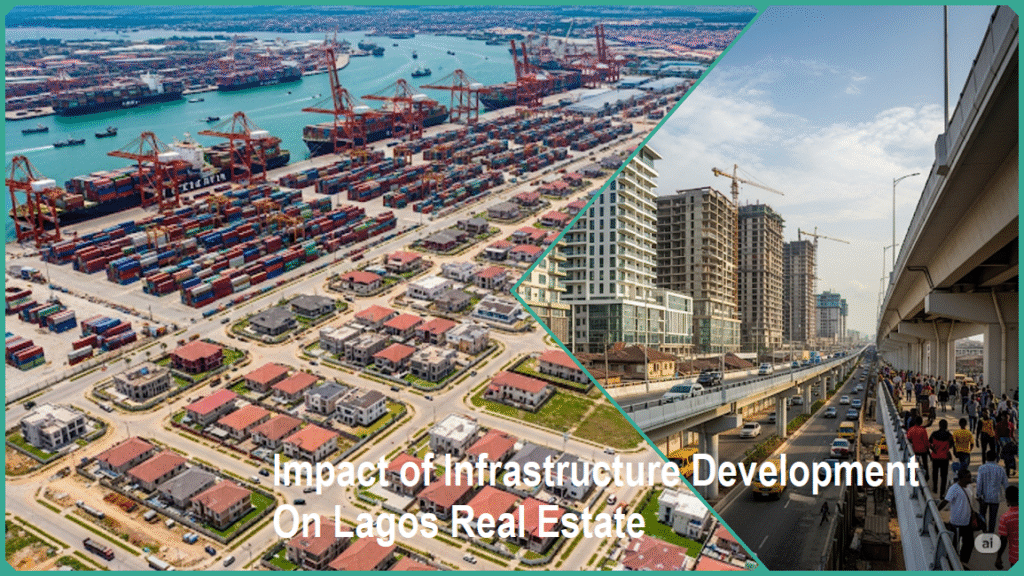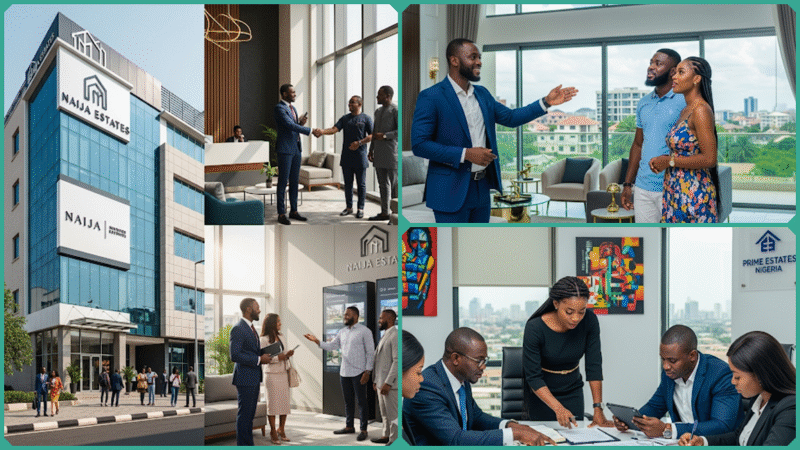Impact of Infrastructure Development on Lagos Real Estate
Estimated reading time: 18 minutes
Lagos, Nigeria’s largest city and bustling commercial hub, has experienced extraordinary and rapid growth in recent years, largely fueled by a wave of ambitious and large-scale infrastructure projects. This ongoing transformation is significantly reshaping the real estate landscape across the city, creating a wealth of abundant opportunities as well as complex challenges for a wide range of stakeholders, including investors, developers, homeowners, and urban planners alike.
For anyone with a stake or interest in Lagos real estate—whether local or international investors, property developers, real estate agents, or prospective homebuyers—understanding the intricate relationship between infrastructure and property values is crucial.

This blog post explores how infrastructure development acts as a catalyst for real estate growth in Lagos, highlighting key projects, trends, and investment hotspots. It also outlines practical insights to help you make informed decisions in Lagos’s dynamic property market.
Why Infrastructure Development Matters for Lagos Real Estate
Infrastructure development plays a fundamental and pivotal role as a key driver of the rapid growth and expansion of Lagos real estate because it directly tackles and addresses the essential challenges faced by the city while simultaneously enhancing the various factors that contribute to making properties far more attractive, desirable, and valuable to real estate investors and residents alike.
More specifically, the comprehensive infrastructure in Lagos—including but not limited to roads, railways, ports, power supply, drainage systems, security measures, and social amenities—functions as the crucial backbone that supports and sustains an efficient, functional, and highly livable urban environment.
This, in turn, has a significant and far-reaching impact on the property market in numerous critical and meaningful ways that influence various aspects of real estate transactions, investment strategies, and market dynamics on both local and national levels:
- Property Accessibility and Connectivity: Well-developed transport networks such as roads and railways reduce the notoriously long commute times in Lagos. This improved connectivity makes residential and commercial locations more appealing, expanding where people want to live and work. For example, projects like the Lagos Rail Mass Transit and the Fourth Mainland Bridge are easing movement across the city and stimulating demand in areas previously considered remote.
- Property Value Appreciation: Real estate close to new or upgraded infrastructure typically experiences notable appreciation in value. In Lagos, areas like Ibeju-Lekki and Epe have seen land and property prices surge by over 300% in some cases—due to proximity to major projects like the Lekki Deep Seaport and road expansions. This appreciation reflects real estate investor confidence that infrastructure equals growth and profitability.
- Urban Expansion and New Markets: Infrastructure opens up previously underdeveloped or inaccessible regions, supporting urban sprawl and creating new real estate hotspots. Emerging corridors fueled by infrastructure development attract both commercial and residential projects, leading to diversification across Lagos’s geography away from congested central zones.
- Livability and Quality of Life: Reliable utilities (like power), effective drainage to reduce flooding, security improvements, and access to social amenities enhance everyday living conditions. Such factors increase demand for housing and commercial space by making neighborhoods safer, more comfortable, and convenient—qualities especially important for renters and homeowners considering long-term occupancy.
- Investor Confidence: Visible commitments from the government and the private sector to infrastructure signal political stability and economic growth, encouraging both local and diaspora investors to enter the market. This confidence reduces perceived risks and fosters a more vibrant real estate ecosystem.
Given Lagos’s historical challenges with traffic congestion, flooding, and unstable power supply, infrastructure development is not only beneficial but transformative. It fundamentally changes the real estate landscape by enabling new growth, boosting property values, and improving overall city functionality.
Consequently, Lagos’s government continues prioritizing infrastructure in its budgets and urban plans, recognizing that sustained infrastructure investment is pivotal to the city’s real estate market vitality and its ability to accommodate rapid urbanization.
In Summary
Infrastructure development holds immense significance for Lagos real estate because it greatly improves accessibility to various parts of the city, making it easier for residents and businesses to connect and operate efficiently. It also plays a critical role in accelerating property value appreciation, as well-developed infrastructure attracts more buyers and investors.
Furthermore, it drives urban expansion by enabling the city to grow in a more organized and sustainable manner. Improved infrastructure contributes to higher living standards by providing better transportation, utilities, and amenities, which in turn enhances the overall quality of life for Lagos inhabitants.
Additionally, robust infrastructure builds greater trust and confidence among real estate investors, who view it as a key indicator of a stable and promising real estate market. All these factors combined are essential for fostering a vibrant and thriving property market in Lagos, Africa’s largest and most dynamic megacity.
Key Infrastructure Projects Driving Lagos Real Estate Growth
Several significant and large-scale infrastructure projects are presently propelling the rapid growth and profound transformation of the Lagos real estate market, fundamentally reshaping the way urban living is experienced and expanding the range of investment opportunities available.
These comprehensive initiatives are designed to enhance overall accessibility across the city, serve as powerful catalysts for increased economic activity, and unlock previously untapped or underdeveloped regions, thereby creating exciting new areas ripe for development and expansion:
| Project Name | Description & Impact | Targeted Areas |
|---|---|---|
| Lekki Free Trade Zone | A massive industrial and commercial hub attracting businesses and workers, boosting real estate demand | Lekki, Ibeju-Lekki |
| Lekki Deep Seaport | Africa’s largest deep-sea port is enhancing Lagos’ trade capacity, elevating property values around it | Lekki, Epe |
| Blue Line Rail | A proposed mass transit rail system connecting Marina to Mile 2, significantly improving commuter access | Mainland and Island corridors |
| Red Line Railway | Rail link from Agbado to Ebute-Metta, enhancing accessibility for residential and commercial properties | Mainland Lagos |
| Lagos-Ibadan Expressway | A key highway linking Lagos to neighboring states, facilitating suburban growth and commerce | Alagbado, Ogun, Ibadan routes |
| Fourth Mainland Bridge | Planned a new bridge connecting Lagos Island and the mainland, easing traffic and unlocking hinterland real estate | Ikorodu, Epe |
These projects collectively tackle Lagos’ long-standing and persistent challenges related to traffic congestion, inadequate connectivity, and limited accessibility. These issues have historically posed significant obstacles, severely restricting real estate development and hindering the broader urban expansion that the city has desperately needed for many years.
How Infrastructure Development Impacts Property Values in Lagos
Infrastructure development plays a crucial and multifaceted role in shaping property values in Lagos, influencing them through a variety of interconnected and complex mechanisms that work together to enhance the overall real estate market dynamics in the region:
- Improved Accessibility Spurs Demand: Properties located near new or upgraded transport infrastructure—such as roads, rail transit stations, and transport hubs—see heightened demand from residents and businesses that prioritize convenience. For example, land prices near the proposed Blue Line Rail stations have surged by 30% to 45% even before full completion, reflecting speculative interest and confidence in improved connectivity.
- Price Appreciation in Emerging Areas: Infrastructure investments catalyze substantial price increases in areas previously considered peripheral or underdeveloped. In Lagos, neighborhoods like Ibeju-Lekki and Epe have experienced dramatic appreciation due to projects like the Lekki-Epe Expressway expansion, proximity to the Dangote Refinery, and the Lekki Deep Seaport. For instance, land in Ibeju-Lekki that was priced around ₦500,000–₦1.5 million in 2013 surged to ₦25 million–₦40 million by early 2025—a 40-fold increase over a decade.
- Creation of New Real Estate Hotspots: Major infrastructure projects not only revive existing areas but also generate entirely new economic hubs and urban corridors. Developments like Eko Atlantic City and the Lagos Free Trade Zone attract high-income residents, multinational businesses, and foreign investors, thereby lifting the standard and price levels of real estate markets in these zones.
- Reduction of Common Urban Challenges: Improvements in drainage systems, security measures, reliable power supply, and road networks directly address Lagos’s chronic issues of flooding, traffic congestion, and insecurity. This enhances the attractiveness and sustainability of both residential and commercial developments, encouraging higher occupancy and willingness to pay premium prices.
- Boost to Rental Yields and Occupancy Rates: As infrastructure boosts business growth and employment opportunities, housing demand rises, improving rental yields and occupancy rates. For long-term investors, this translates into more stable and potentially higher income streams from leased properties.
- Connectivity-Driven Price Differentials: Properties located along well-maintained major roads or close to key infrastructure command significantly higher prices than similar properties with poor accessibility. Buyers value convenience and reliability, and this premium can amount to tens of millions of naira in price differences.
- Suburbanization and Expansion Trends: Due to traffic pressure in central Lagos, many real estate investors and developers are focusing on suburban and hinterland areas such as Ikorodu, Alagbado, and Epe. Improved road networks and planned transport lines in these regions have turned them into attractive alternatives for affordable housing and investment with promising appreciation potential.
- Industrial and Logistics Real Estate Boom: The establishment of the Lekki Deep Seaport and Free Trade Zone has spurred demand for warehouses, factories, and logistics centers, adding a lucrative segment to Lagos’s real estate market and further driving land values in related areas.
Overall, infrastructure development serves as an exceptionally powerful catalyst for the growth and dynamism of the Lagos real estate market by significantly enhancing accessibility to various parts of the city, opening up new and previously untapped markets, improving the overall quality of life for residents, and fostering greater confidence among both local and international investors.
Consequently, buyers, investors, and developers tend to place a considerably higher premium on properties that directly benefit from these critical infrastructure improvements, which in turn causes property values to increase sharply and consistently in these strategically developed regions.
Current Trends and Opportunities in Lagos Real Estate
Current trends and emerging opportunities in the Lagos real estate market for the year 2025 are strongly centered around several key factors, including:
- The increasing suburbanization of residential and commercial areas
- The rapid development of mixed-use properties that combine living, working, and recreational spaces
- Significant growth in industrial zones
- Dynamic price changes are driven by improvements in transportation connectivity and infrastructure.
These elements collectively shape the evolving landscape of Lagos real estate, presenting a broad range of possibilities for investors, developers, and residents alike.
Suburbanization and Hinterland Growth
Due to Lagos’ worsening traffic congestion in central areas, developers and investors are increasingly focusing on the mainland and outskirts such as Ikorodu, Alagbado, and Epe. These areas benefit from ongoing infrastructure projects—improved road networks and planned transport lines—that enhance accessibility and reduce commute times.
This trend is driving rapid urban expansion, creating affordable housing options and attracting both developers and end-users seeking convenience outside the congested city core. Population growth and infrastructural improvements here translate to strong real estate demand and price appreciation, with areas like Epe noted as fast-rising investment frontiers due to proximity to new industrial hubs and transport links.
Mixed-Use Developments
Integrated estates that combine residential, commercial, and recreational facilities are gaining popularity, particularly near major infrastructure projects like the Lekki Free Trade Zone. Such developments appeal to residents who want live-work-play environments that reduce the need for long commutes and provide convenient access to amenities.
This trend responds to growing demand for lifestyle-oriented real estate solutions and supports sustainable urban growth. Developers are leveraging infrastructure advances to create these self-contained communities, which also attract premium rents and better occupancies.
Industrial and Logistics Real Estate Boom
The establishment and expansion of major facilities like the Lekki Deep Seaport and the Lekki Free Trade Zone are driving significant demand for industrial real estate—warehouses, factories, and logistics hubs—around these zones.
This sector presents lucrative investment opportunities tied directly to Lagos’s growing role as a commercial and trade gateway in Africa. The industrial real estate boom also spills over into residential demand as employees seek housing nearby, further boosting local property markets.
Connectivity-Driven Price Differentials
There is a well-documented premium on properties situated along well-maintained and well-connected roads or close to transport hubs. Research indicates that identical properties in accessible locations command prices tens of millions of naira higher than those in poorly accessible or underdeveloped areas.
This price differential underlines buyers’ and real estate investors’ preference for infrastructure quality, convenience, and reduced travel costs. This factor is particularly influential in Lagos, where infrastructure remains a critical constraint in many areas.
Additional Insights:
- Population growth in Lagos, over 20 million people and rising, fuels relentless housing demand that is far outstripping supply, ensuring sustained interest in emerging suburbs and mixed-use projects.
- Government initiatives and private sector investments continue to prioritize infrastructure expansion, which will maintain momentum in transforming real estate hotspots.
- Interest rate fluctuations and affordability remain factors investors must consider, but strategic location near infrastructure projects often mitigates these risks due to strong capital appreciation and rental demand potential.
In Summary
Lagos real estate in 2025 is characterized by notable expansion into suburban corridors, driven by improved connectivity and enhanced transportation networks that make these areas more accessible and attractive. There is a significant rise in integrated mixed-use developments that combine residential, commercial, and recreational spaces into cohesive communities, reflecting a modern approach to urban planning.
Additionally, the industrial and logistics real estate sector is booming, closely linked to the development of new ports and trade zones, which are fueling demand for warehousing and distribution facilities. Moreover, properties that benefit from high-quality infrastructure command substantial price premiums, underscoring the importance of infrastructure investment in shaping real estate values.
For real estate investors, developers, and homebuyers alike, these emerging trends provide clear and valuable guidance on where to focus their attention to maximize growth opportunities and secure strong returns in the evolving Lagos market.
Real Estate Investment Insights in Lagos—Top Areas to Explore
Key Lagos real estate investment insights for 2025 emphasize several highly promising areas that are closely connected to both ongoing and planned infrastructure projects throughout the city. These specific locations demonstrate significant potential for substantial capital appreciation as well as attractive rental yields, particularly for early investors who carefully track and analyze infrastructure developments and rollouts in the region.
| Area | Key Infrastructure | Investment Potential | Current Status |
|---|---|---|---|
| Ibeju-Lekki | Deep Sea Port, Free Trade Zone, Lekki-Epe Expressway | High return; emerging commercial hub | Rapid growth; infrastructure ongoing |
| Epe | Lekki-Epe Expressway expansion, Lagos-Calabar Coastal Road | Affordable alternative; fast-growing corridor | Growing investor attention |
| Ikorodu | Proposed Fourth Mainland Bridge, rail links | New connectivity; suburban development | Pre-boom phase; high upside |
| Alagbado | Lagos-Ibadan Expressway, Red Line Rail | Affordable, accessible suburb | Increasing demand; infrastructural upgrades planned |
| Lekki Phase 1 & 2 | Established expressways, utilities | Stable market with high-end properties | Mature market with steady appreciation |
Why These Areas?
- Ibeju-Lekki is the epicenter of Lagos’s industrial and commercial growth, anchored by the operational Lekki Deep Seaport and Free Trade Zone. This drives demand for residential, commercial, and industrial real estate, making it one of the highest return zones in Lagos.
- Epe benefits immensely from infrastructural attention, including expansions of the Lekki-Epe Expressway and proximity to major projects like the Dangote Refinery. It offers more affordable land prices compared to core Lagos areas, attracting investors aiming for long-term growth.
- Ikorodu is poised for rapid development thanks to planned connectivity enhancements like the Fourth Mainland Bridge and new rail links. This transforms it from a suburban outskirt into a promising real estate hotspot with significant upside potential.
- Alagbado enjoys its position along the Lagos-Ibadan Expressway and the upcoming Red Line Rail, making it an accessible and affordable alternative to inner Lagos. Government infrastructural upgrades planned here further enhance its prospects.
- Lekki Phase 1 & 2 remain Lagos’s established luxury markets, with mature infrastructure and steady property appreciation. They are preferred for high-end residential and commercial developments and offer stability despite higher entry costs.
Additional Insights
- Early investments in these zones before infrastructure completion tend to yield the best capital appreciation and rental returns. Staying informed on government and private sector infrastructure announcements can guide timely investment decisions.
- Infrastructure projects like the Lekki Free Trade Zone, Deep Sea Port, and new expressways catalyze economic activities, stimulating housing demand and transforming local economies.
- Suburbanization trends favor areas with improved connectivity, encouraging more affordable yet growth-potential real estate markets outside the core Lagos Island and Victoria Island.
Strategic Recommendations
- For those seeking high-return opportunities in emerging commercial hubs, it is highly advisable to concentrate your attention on the rapidly developing areas of Ibeju-Lekki and Epe. These locations are showing significant promise and potential for substantial economic growth and investment returns shortly.
- For those interested in suburban growth areas with significant potential for strong upside, it is worth considering locations such as Ikorodu and Alagbado. These areas are experiencing rapid development and offer promising opportunities for investment and expansion.
- For those seeking stable and luxurious investment opportunities, focus your attention on Lekki Phase 1 and Phase 2, as well as the surrounding adjacent premium districts. These areas are renowned for their high-end developments and consistent growth potential, making them ideal for long-term, secure investments in the luxury real estate market.
Closely monitor ongoing and upcoming infrastructure developments as key indicators of potential future growth in the area; by carefully leveraging these valuable insights, you can strategically optimize the overall performance and value of your real estate portfolio.
FAQs
How does infrastructure affect property prices in Lagos?
Infrastructure improvements—such as better roads, rail transit, ports, power, drainage, and security—greatly enhance property accessibility, reduce commute times, and improve living conditions. This makes properties more desirable, leading to significant price appreciation.
For example, areas near transport projects like the Blue Line Rail have seen land prices increase by 30-45% even before project completion. Overall, Lagos residential property prices grew by nearly 40% in 2024 and are forecasted to rise another 5-15% in 2025, largely driven by infrastructure development and rapid urbanization.
Which Lagos areas are most impacted by current infrastructure developments?
Key growth corridors benefiting from major infrastructure investments include Ibeju-Lekki, Epe, Ikorodu, and Alagbado. For instance, Ibeju-Lekki is witnessing rapid transformation due to the Lekki Deep Seaport, Free Trade Zone, and Lekki-Epe Expressway expansion, attracting businesses and residents. Epe and Ikorodu are emerging as affordable suburban hubs tied to new transport links, while Alagbado benefits from highway and proposed rail upgrades.
Can infrastructure development guarantee high returns on Lagos real estate?
Infrastructure development is a strong indicator of potential capital appreciation and rental demand, but it does not guarantee returns. It significantly improves accessibility and investor confidence, which historically correlates with rising property values.
However, returns also depend on market conditions, property type, timing, and location specifics. Early investments in infrastructure-linked areas generally yield better returns, but factors such as economic volatility and regulatory challenges must be considered.
What infrastructure projects should investors watch in the next 5 years?
Investors are strongly encouraged to closely monitor major ongoing and planned projects such as the following initiatives:
- Blue and Red Line Rail systems are improving mass transit across the Lagos mainland and island
- Fourth Mainland Bridge, to ease traffic and open suburban areas like Ikorodu and Epe
- Lagos-Calabar Coastal Road enhancing regional connectivity
- Lekki Deep Seaport expansion and Free Trade Zone development
- Continued upgrades to road networks such as the Lagos-Ibadan Expressway
These projects are anticipated to open up entirely new development corridors, creating fresh opportunities for growth and expansion. As a result, they are also expected to substantially increase property values, bringing significant economic benefits to the surrounding areas.
How do infrastructure improvements impact renters and homeowners?
Infrastructure upgrades enhance livability by reducing travel times, improving safety, and ensuring more reliable utilities (electricity, water, drainage). This fosters greater access to schools, healthcare, and businesses, making neighborhoods more attractive for long-term residence or rental. Improved infrastructure also helps reduce flooding and traffic congestion, key quality-of-life factors for Lagos residents. Consequently, demand for housing in well-serviced areas increases, supporting higher rental yields and occupancy rates.
In Conclusion
The impact of infrastructure development on Lagos’ real estate cannot be overstated. Strategic investments in roads, rail, ports, power, and social amenities are driving unprecedented urban expansion, property value appreciation, and market diversification across Lagos.
For real estate investors—whether speculative, long-term, or diaspora—monitoring infrastructure projects provides invaluable insights into emerging hotspots and sustainable investment opportunities. Property developers can leverage infrastructure data to prioritize and tailor projects to rising demand corridors.
Real estate agents gain a competitive advantage by advising clients based on infrastructure-driven price dynamics and market trends. As Lagos continues to evolve with these massive infrastructure projects largely funded by government initiatives and private sector partnerships, the real estate market stands poised for solid, sustained growth.
- Actionable advice: Stay informed through government announcements, real estate news, and infrastructure updates. Consider early investments in growing corridors like Ibeju-Lekki, Epe, and Ikorodu to maximize potential returns. Engage professionals who understand the nexus between urban infrastructure and property values to optimize your portfolio performance.
For personalized and comprehensive guidance on effectively tapping into the vast real estate potential that Lagos offers, especially as it is driven by significant infrastructure developments, it is highly recommended to reach out to specialist consultants and brokers.
These professionals combine deep urban planning insights with extensive market expertise to provide tailored advice that can help you navigate the dynamic property landscape in Lagos with confidence and strategic advantage.
Discover more from Skill to Grow
Subscribe to get the latest posts sent to your email.






